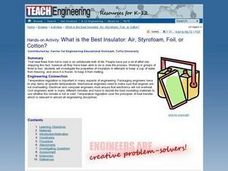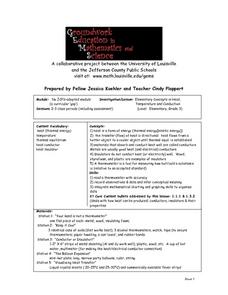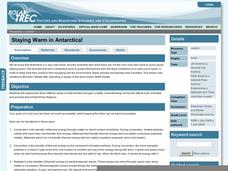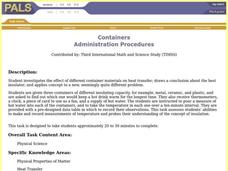Curated OER
Conductors and Insulators
Fifth graders explore conductors and insulators. In this science lesson, 5th graders act as electrons moving through a wire. Students break into groups representing conductors and insulators and explore how they work with electrons.
Curated OER
Thermal Energy
Explore thermal energy with your class with this introductory presentation. While there is information about heat, conduction, temperature and other topics, further information could be added to make it a richer experience.
Curated OER
How Hot Is It?
Discuss the difference between conduction, convection and radiation of thermal energy, and complete activities with your class by investigating the difference between temperature, thermal energy and the heat capacity of different materials.
Curated OER
TE Lesson: Using Heat from the Sun
Students examine fossil fuels, nuclear and renewable fuels. They study investigate types of heat transfer such as convection, conduction, and radiation. They complete crossword puzzles based on the vocabulary. They design, construct and...
Curated OER
Keeping Warm?
Fifth graders explore conductors and heat loss in different materials. In this Physical Science lesson plan, 5th graders will be measuring the temperature drop of water in four containers. The class will then discuss what an...
Curated OER
Three Little Pigs and Heat Transfer
Students use the Internet to research the ancient practices of building structures and to help them recognize what building materials serve as good conductors and insulators of heat. They build a structure using straw bale walls.
Curated OER
What is the Best Insulator: Air, Styrofoam, Foil, or Cotton?
Students investigate the properties of insulators by attempting to keep a cup of water from freezing, and once it is frozen, to keep it from melting. They conduct the experiment, record and analyze the results, and answer discussion...
Curated OER
Energy/Light/Heat/Sound
Fourth graders study the properties of heat in this series of lessons. They discuss sources of heat and experiment to determine its properties. They identify insulators and conductors by measuring temperatures, and graphing their data....
Curated OER
Heat and Matter
Students explore liquids and solids by conducting in class experiments. In this matter lesson, students define the properties of matter and how heat can change those properties. Students experiment with heating objects such as butter and...
Curated OER
Heat Misconceptions
Third graders determine that gloves do not provide heat, but rather, they insulate or hold in any heat that is in their hand. They discuss the different temperatures found in ecosystems around the world. What do animals that live in...
Curated OER
Insulators, Conductors, and Energy Transfer
Third graders conduct experiments to determine what types of material make good insulators. They prepare a graph of time vs. temperature for their sample. They choose a graph using each kind of material to display for class analysis and...
Curated OER
Elementary Concepts in Heat
Third graders read a thermometer with accuracy, record observations and data, and infer conceptual meaning. They integrate mathematical charting and graphing skills to organize their data. They explore what happens when they touch or use...
Curated OER
Insulators
Sixth graders examine properties of four types of spoons, record observations, and apply their knowledge by designing the perfect hot chocolate cup.
Curated OER
Keeping Warm
Students participate in an online activity to determine how objects heat and cool. They determine what objects best serve as thermal insulators.
Curated OER
Thermal Energy and Heat Unit
Pupils explain that heat energy in a material consists of the disordered motions of its atoms or molecules. They know and explain that transformations of energy usually transform some energy into the form of heat, which dissipates by...
Curated OER
Go with the Flow
Students gain an understanding of the difference between electrical conductors and insulators, and experience recognizing a conductor by its material properties. They build a conductivity tester to determine whether different objects are...
Polar Trec
Staying Warm in Antarctica!
Has your class ever wondered how animals and scientists stay warm in the Polar Regions? Kids will investigate to understand the three types of heat transfer and how heat transfer affects those trying to stay toasty in sub-zero...
Curated OER
Containers
Students investigate the effect of different container materials on heat transfer; draws a conclusion about the best insulator; and applies concept to a new, seemingly quite different problem.
Curated OER
Highways and Stop Signs
Fourth graders investigate conductors and insulators and distinguish between the two. They utilize the digital camera and other forms of technology to create a study guide on conductors to help students develop sound knowledge.
Curated OER
Keeping Warm
Young scholars investigate how different types of objects act as thermal insulators. In this online lesson plan, students hypothesize how particular objects act as insulators and then complete the online activity to determine which...
Purdue University
Design of a Door Alarm
How does electricity work? Budding scientists explore the concepts of electrical currents and open and closed circuits with class discussion and a hands-on activity using a battery to turn on a light bulb. Learners also make predictions...
Curated OER
Conductivity
Students work together to create a simple conductivity tester. They discover the difference between conductors and insulators. They test different types of materials for their conductivity as well.
Curated OER
Power: Work and Energy
Students explore how work and energy create power. They complete activities involving simple machines, energy, energy conversion, and the role of conductors and insulators. They choose from a menu of options the activities they would...
Curated OER
Sunlight and Warm Air
Students discuss radiant energy from the sun, performing a simple experiment with sun glasses and bright light to demonstrate the concept. Students further participate in simple in-class experiments to demonstrate: air density as it...























